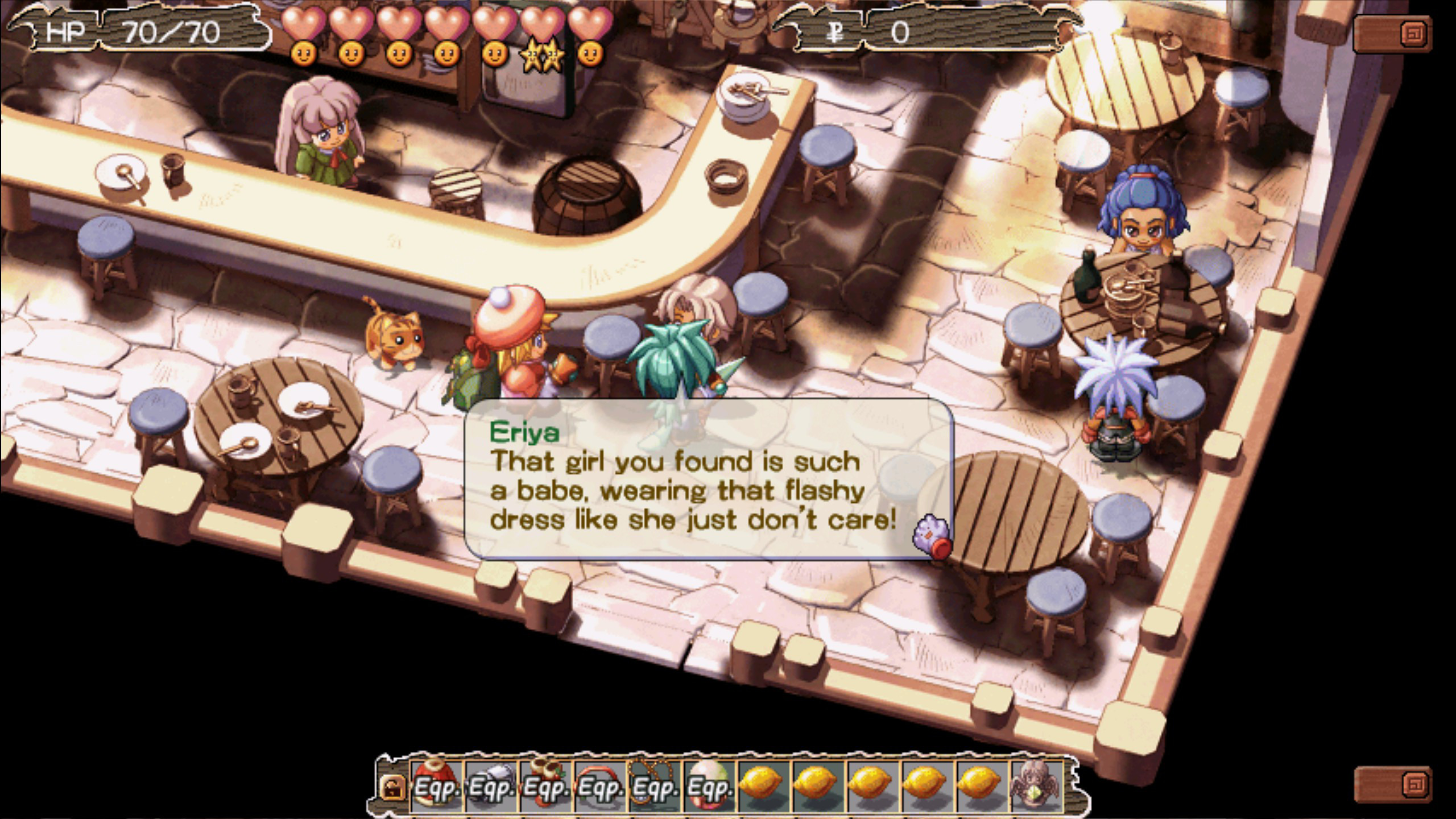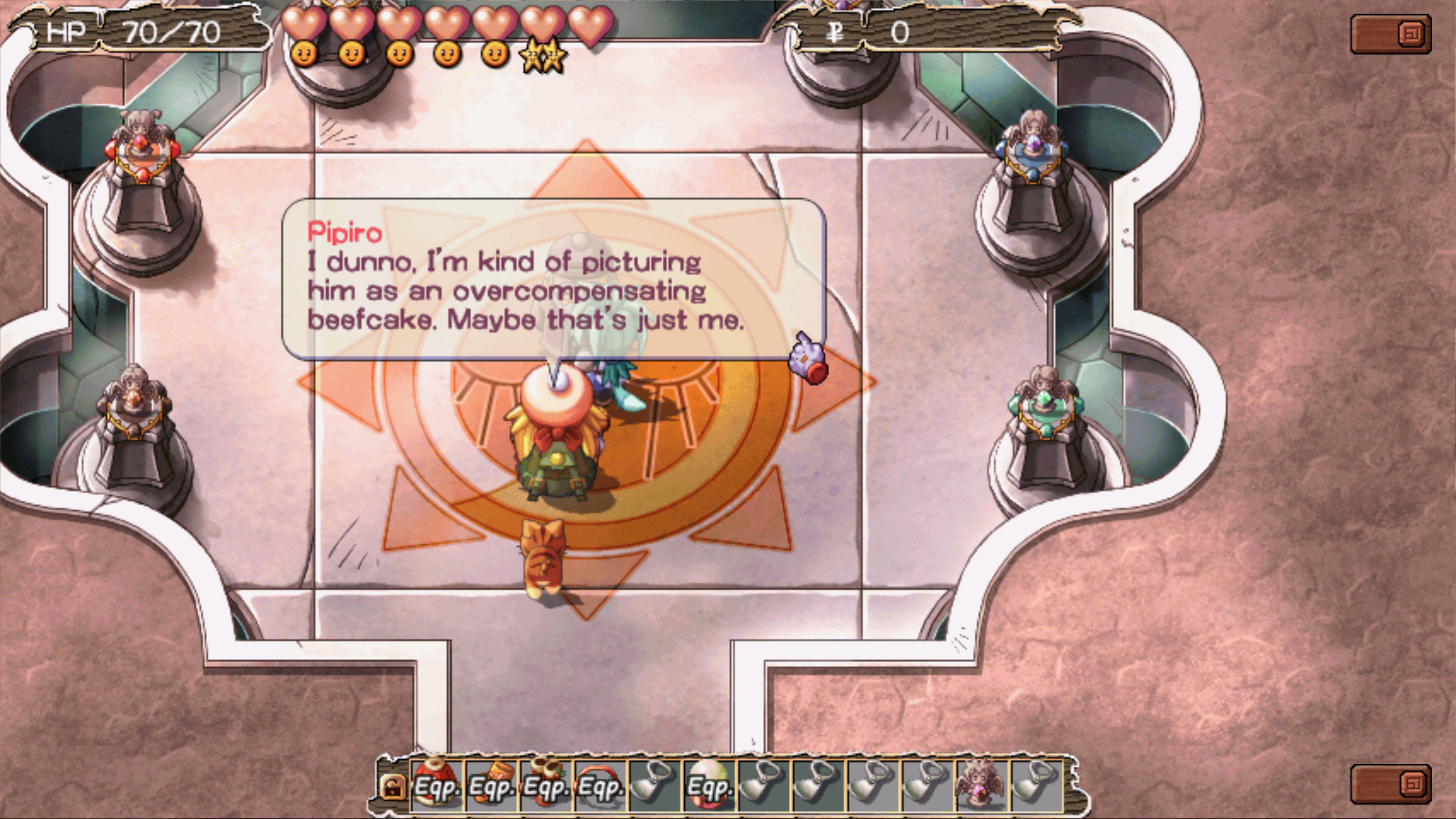Search
[{{{type}}}] {{{reason}}}
{{/data.error.root_cause}}{{{_source.title}}} {{#_source.showPrice}} {{{_source.displayPrice}}} {{/_source.showPrice}}
{{#_source.showLink}} {{/_source.showLink}} {{#_source.showDate}}{{{_source.displayDate}}}
{{/_source.showDate}}{{{_source.description}}}
{{#_source.additionalInfo}}{{#_source.additionalFields}} {{#title}} {{{label}}}: {{{title}}} {{/title}} {{/_source.additionalFields}}
{{/_source.additionalInfo}}- Details
- Category: Computer
- By Jason Gress
- Hits: 5130
Zwei: The Arges Adventure (PC)

Zwei: The Arges Adventure
Developed By: Nihon Falcom
Published By: XSEED Games
Release Date: January 24, 2018
Available On: Windows
ESRB Rating: N/A
Genre: Action Role Playing Game
Mode: Single Player
MSRP: $19.99
(Humble Store Link)
Thank you XSEED Games for sending us this game to review!
It has to be said that XSEED Games never ceases to amaze me. Several of their employees are true-blue Falcom fans, and they are willing to release games, at substantial effort and investment, that other companies would never even dream of releasing. How many localization companies, that you know of, would release a game originally published in Japan in 2001, and then localize it? I don't mean a remake – I mean the original game. And not only that, but they hired a programmer, who spent a significant amount of time reworking the game engine to work on modern computers. This includes making some of the more quirky features, like standalone desktop apps, integrate into the game itself in a way that makes sense. What they have done here is frankly mind-blowing.
Zwei: The Arges Adventure, originally called Zwei!!, is one of Falcom's more loved cult-classics. The sequel, Zwei II, was released here last year as Zwei: The Ilvard Insurrection. What makes Zwei: AA so special is the absolutely gorgeous hand-drawn artwork, the fantastic soundtrack, and the lovable, joy-filled atmosphere and characters. In many ways the game is a product of its time, and has old-school sensibilities, but the art, music, and characters are absolutely timeless.
Pokkle and Pipiro are step brother and sister whose parents both passed away. They are fourteen years old, and live together in their inherited home in a backwoods floating island called Arges, in the only town there, Puck. Puck has a very homey feel, with a self-proclaimed archduke, a church, a temple, a doctor, a weaponsmith, a tailor, and of course, a pub. There isn't much to this little place, but the village as a whole, and the local nun especially, have raised Pokkle and Pipiro since their parents' passing and their mutual affection comes through wonderfully in every bit of dialog.
Pokkle is a hopeless punster, whose goofy lines and constant search for humor is both hilarious and pathetic. He also has a wonderfully optimistic outlook, a kind heart, and a soft spot for attractive older women. Pipiro is an unfiltered, sarcastic fashionista, who also just so happens to be incredibly gifted with magic. He tends to want to help out of the goodness of his heart, whereas she leans towards looking out for number one.

Strong Points: Absolutely fantastic hand-drawn art style; incredible soundtrack; really likable characters; tons of humorous dialog; lots of player freedom; best version of this classic game; quite challenging
Weak Points: Resolution fixed at 854x480; game has very little player direction; simplistic game mechanics; occasional bugs and quirky controls; 3D rendered bosses that look out of place; quite challenging
Moral Warnings: Fantasy violence; lots of magic use, by both the player and enemies; idols of the six elements present; enemies include demons; references to the dark and light goddesses; curse words used, including 'h*ll', 'd*mn', '*ss', 'b*st*rd', and the portmanteau 'fugly'; alcohol used by non-player characters, including drunkenness; a main character has the hots for older women; one character asks you if you like your stepsister romantically
One of my favorite aspects of Falcom games has been their treatment of NPCs, and Zwei!! is no exception. Each character's dialog changes every time a major event happens, and you should always speak to each person at least twice, and sometimes even more times than that, as there will often be different reactions depending on who is talking. Even more than just the people, this game is filled with random items, trees, and more to examine, and some of the best puns in the game are there, just waiting to be discovered.
Those familiar with the German language may notice something about the title: zwei is the German word for the number 'two'. One of the things that makes the Zwei series unique is that both entries (starting with this one, obviously) always have your team in a group of two. So both Pokkle and Pipiro (as Ragna and Alwen are in Zwei II) can be switched back and forth with the press of a button, and they are always together. In story sequences, the banter between them is one of the many ways that you get to know them and other characters better.
Zwei: The Arges Adventure is a top-down 2D action RPG where Pokkle attacks through a jutting out motion, and Pipiro attacks through her ranged magic attacks. The mechanics are fairly simple – almost too simple, as there really isn't much to combat, but small upgrades are eventually added, like charge attacks, various armor pieces, and different kinds of magic. Zwei really makes the most of this simple combat, with various enemies and bosses that are quite challenging, as well as dungeon puzzles throughout that will keep you thinking.
Despite the relative simplicity of the combat, the amazing art, the fantastic music, and the fun of stuffing yourself silly to gain levels is more than enough to drive you to keep going. There is actually quite a bit to do, as there are dozens of dungeons, and several hidden items and areas, and even a few things you have to go back later to get. There are also several secret and optional bosses, which are quite difficult – I eventually gave up on a few of them, because I had this review to write! It took me around 33 hours (and I didn't see everything), while Steam recorded closer to 44 hours, because it's difficult, and I died a lot.
Speaking of which, there is a somewhat unique death mechanic here. When you die, you have the choice of either going back to the title screen, going back to the last save, or going home. The first one is the only one where you really lose progress (though that is sometimes still preferable). The other two, you go back to the choice you made, but you keep what you picked up, while also losing whatever money and items you dropped upon death. Depending on what you lost, it may be worth it – but any item – literally anything – can be lost; if you lose something important, you can buy it again from a merchant, for sometimes a hefty price. On the plus side, if you saved in that dungeon, when you return to the level, what was dead before stays that way.
I hinted at it before, but the art is nothing short of gorgeous. The screen resolution is actually really small, at 854x480 (which was an XSEED created enhancement; I believe the original was 640x480) but the watercolor-like art style, along with some simple blending, makes it all look great, so the resolution doesn't matter. The text suffers a bit, but it's really no big deal. The characters also look really nice, with a hand-drawn chibi art style that's pretty neat. The enemies are a bit of a mixed bag though; many of them are (poorly) 3D rendered with hideously bad looking polygons at a very low resolution. They really don't fit the art style at all, but I guess Falcom went that route because making larger enemies move about and attack in less predictable ways must have been difficult for them at the time using hand-drawn art.

Higher is better
(10/10 is perfect)
Game Score - 84%
Gameplay - 15/20
Graphics - 9/10
Sound - 10/10
Stability - 4/5
Controls - 4/5
Morality Score - 78%
Violence - 6.5/10
Language - 7/10
Sexual Content - 9/10
Occult/Supernatural - 6.5/10
Cultural/Moral/Ethical - 10/10
The music soundtrack is also equally excellent. Both the original PC music tracks, as well as the PSP arranged soundtrack, are available to choose from the settings menu screen. Both are pretty good, but I have to give a strong nod to the original soundtrack, as I feel that it's consistently better, though the arranged tracks do have a few standout ones also. It's hard to overstate how fantastic the soundtrack is, though. I cranked it many times, to the chagrin of my wife (the kids loved it too!). The sound effects do the job pretty well, though getting the volume balance right from the menu screen is a bit tricky.
As far as the game itself goes, it's a lot of fun, though it definitely does not hold your hand. I didn't have too much trouble with it; after all, I've played through and beaten much worse back in the NES and SNES days, but you are definitely expected to explore much on your own, as there are only very occasional hints from townspeople on where to go next. Much of the time, it's a case of if you see an open dungeon, that's probably where you're supposed to go; though even that might not be enough, as there are a bunch of dungeons open at a time, so paying attention to the level requirements is probably your best bet. There are also a couple of secrets, or hidden dungeons, that are not easy to figure out at all. Knowing to right-click on (or activate) the sandbag at just the right place was far from obvious.
The controls and interface, from what I understand, are massively improved from the Japanese version that this release was based on. The original PC version had very poor gamepad controls, where this one is almost completely playable without a keyboard or mouse, though there are still a few cases where it's much easier to have one. In one case, you have to drag an item from your hot bar to drop it in a lake. It's possible with a gamepad, but the mouse is much easier. And it's really easy to accidentally eat something, as the button to eat is also sometimes used to cancel, but you do eventually figure it out.
From a moral perspective, this game looks like it should be squeaky clean, but it's not quite there. For one, several curse words are used, including 'h*ll', 'd*mn', '*ss', 'b*st*rd', and the portmanteau 'fugly'. Alcohol is used by non-player characters to drunkenness, and Pokkle finds himself wishing he could have some on more than one occasion. Fantasy violence is a given, though no blood or gore. Magic is used by both enemies and the player. The world was created by two goddesses, the goddess of light and the goddess of dark. There are six idols that you are tasked with finding, each representing one element. Enemies include demons, as well as your more typical fare. The church that the nun is in resembles Catholicism; there are also Bibles there.
From a sexual content perspective it's mostly clean, though there is a womanizer wayward husband (who only talks and looks, but never acts), and others who consistently appraise some of the women in town. Pokkle has the hots for older women, and one character encourages the two of them to become a couple, which they thankfully respond 'eww gross, we're siblings!'
Zwei: The Arges Adventure is clearly a labor of love from XSEED Games to Falcom and lovers of classic games everywhere. It's not without its rough edges, but the lengths that XSEED's developer went through to make the game work, including massive stability improvements from the original, incorporating mini-games into the base adventure, and so much more, it's simply incredible. If you love classic pixel art, challenging gameplay, and hilarious dialog, there is a lot to like in Zwei!!






